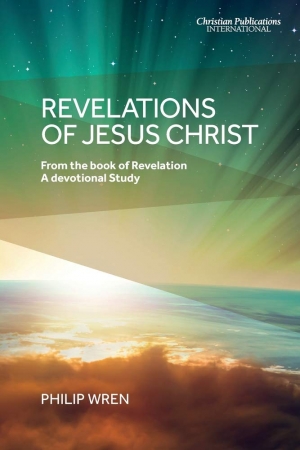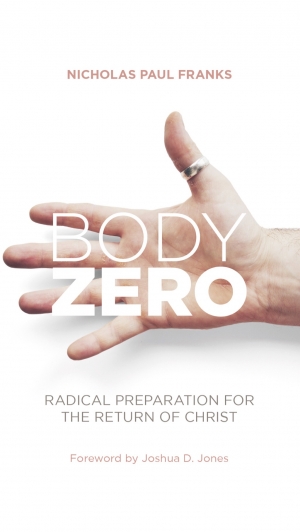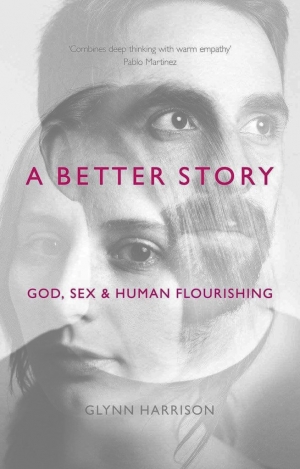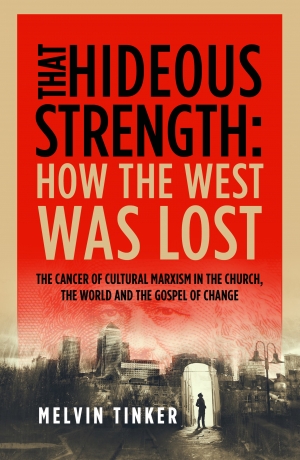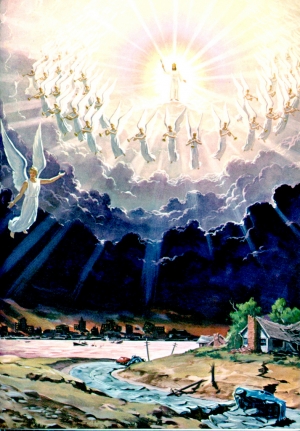General
Displaying items by tag: Christ
The Heart of the Matter
Review: Revelations of Jesus Christ
Simon Pease reviews ‘Revelations of Jesus Christ from the Book of Revelation’ by Philip Wren (Christian Publications International, 2019)
Review: Body Zero
Review: Beloved Warrior
Clifford Denton reviews ‘Beloved Warrior’ by Gail Dixon (ICT Media Tech/Print, 2019)
Gail Dixon has been in Christian ministry and missionary work for nearly 40 years, first with World Horizons and more lately leading its sister organisation, Nations Trust. This inspiring devotional book emerges from her wide-ranging experiences and is based on personal reflection over a long life of discipleship.
One imagines her sitting before the Lord, after all these years of walking with him and praying to him, and being inspired to share the most central aspects of her relationship with him. What has resulted is a book is about the covenant love of Jesus within the battle for the salvation of many - hence the title, Beloved Warrior.
The Battle and the Warrior
Gail includes some remarkable accounts of the intensity of this wider battle, which have resulted in fruit being borne for the Kingdom in lives saved and transformed by Jesus’ love. The accounts draw on both scriptural examples, of those who have gone before, and a multitude of modern-day examples.
But even though the book is about the battle for salvation, the book is structured around and focused on Jesus, the Beloved Warrior. Each of its ten chapters focus on a different characteristic of our Saviour and our relationship with him, including prayer, worship, rest, perseverance, faithfulness and surrender.
Beautiful Writing
Gail seeks to draw the reader into experiencing the Lord’s love and sharing it with others, whatever the commitment and cost. Her writing is scriptural, tender and powerful:
His warfare is full of mercy, full of healing, because the weapon is love. He woos us, through our bruising, and breathes onto us when our flame is dying. He longs for us to know that we are His beloved. He is never discouraged, and as we stand into His love, so we too will discover that we are warriors. His love, His power, flows through us. (p271)
All income from the book will be donated to the work of Nations Trust.
Beloved Warrior (158pp) is available from Amazon as a paperback (£10) and on Kindle (£2.65).
Marriage: A Picture of the Gospel
Charles Gardner reviews ‘A Better Story’ by Glynn Harrison.
The sexual revolution that has caught the Church napping is an opportunity to show that Christians have something infinitely more superior to offer…
…that love and sex is created by God for pleasure and purpose and is all the more enjoyable when following his guidelines. And that it is also a taster and picture of the beautiful intimacy of divine love.
This is the kernel of a thesis ably put forward by Professor Glynn Harrison in his excellent book A Better Story: God, Sex and Human Flourishing (IVP).
Worth Pursuing
Actually, it’s a great read – very well written, not too academic (the author, now retired, used to head the Department of Psychiatry at the University of Bristol), but scholarly nevertheless.
I’ll be honest; due to time constraints, I had intended to simply peek into sample chapters and so started somewhere in the middle. But I was eventually forced to go back to the beginning, and so ended up reading it backwards, in a sense.
But I got the picture. In expanding on an inspiring talk he gave at Keswick in 2016, which I reported on at the time, the professor contends that Christians have been caught off-guard by the revolution which began in the 1960s and which now offers a smorgasbord of sexual options.
Instead of retreating into our holy huddles and pointing fingers, we should have taken the opportunity of demonstrating how exciting, fulfilling and purposeful is traditional marriage – that it’s worth pursuing and waiting for because it is potentially far more rewarding, fruitful and loving than any other sexual liaison.
Instead of retreating into our holy huddles, we should take the opportunity of demonstrating how exciting, fulfilling and purposeful is traditional marriage.
Pride in Biblical Values
As homosexuals have promoted their movement with Gay Pride parades, so Christians should have been taking pride in the biblical call for purity and faithfulness.
As I recall the author saying at Keswick, God doesn’t do one-night stands; he is forever faithful and loves us totally and unconditionally. This is the sort of message married couples need to convey to the watching world – that the union is a beautiful picture of the Gospel, which tells the story of God seeking a bride…of a bridegroom who so loves his wife that he is prepared to die for her.
At the same time, the professor also points out that the sexual revolution has failed in its goal of freeing adherents from the stifling restrictions of earlier generations. For surveys apparently show that people are now actually having less sex.
Meanwhile, we need to prepare for ‘messy church’1 where people in same-sex relationships, and others who are perhaps transgender, get converted. We will need to pray for a balance of grace and truth as we seek to minister effectively to broken people in these dark days.
The Holy Spirit’s Power
I felt there was something missing in the professor’s analysis, however, in that the book lacks an emphasis on the power of the Holy Spirit to help us live right and witness boldly to the truth, along with the vital need for spiritual warfare in the face of the powers of darkness that blind society (and believers too in some cases).
The Christians of 1st-Century Rome condemned the debauched culture around them by their uncompromising, godly lifestyles, refusing to swim with the prevailing tide. No matter how many adjustments we make as we reach out to the sexually confused and wayward, at the end of the day we have to stand up to be counted and risk being thrown to wild animals, as our Roman brothers and sisters were.
Having said that, I highly recommend this book. May we not fail in rising to the challenge it presents.
'A Better Story: God, Sex & Human Flourishing' (192pp, Inter-Varsity Press) is available from Amazon in paperback, e-book and audio-book forms. Also available from the Evangelical Bookshop.
Notes
1 Not to be confused with the growing method of informal outreach used by many churches.
The Long Night
Persecution calls for joy in hope, patience in affliction and faithfulness in prayer.
Imagine feeling a shot of panic every time you hear a motorbike go past your home. Or waving your spouse off to the shops, or your children off to school, knowing there is a distinct possibility they may be abducted or slaughtered. Or wondering every time you go to a church service whether you and your loved ones will come out alive.
This is the grim reality for Christians in many parts of northern and central Africa, where Islamist militant gangs like Boko Haram and al Shabaab are spreading terror, inspired and supported by better-known groups like Al Qaeda.
This month alone, the Barnabas Fund has reported that Islamist gunmen have been on a killing spree in northern Burkina Faso, storming church services, rounding up congregants and shooting them dead. In predominantly Muslim Niger, a pastor has been shot and a church looted, following a spate of attacks on churches. In mainly Christian Cameroon, two Christian villages have been ransacked.
In Nigeria, one of the deadliest countries in Africa for Christians, 17 church-goers were abducted by Boko Haram last weekend whilst at their choir practice. ISIS-inspired Boko Haram are intent on establishing a caliphate from north-eastern Nigeria to northern Cameroon.
Writing this on a beautifully sunny spring day in England, it’s difficult to imagine what these believers and their families are going through. The long night of Islamist persecution in Africa (particularly in the Sahel region) grows ever darker, with no sign of dawn.
Great is the Darkness
The vast regions of western Africa provide sadly plentiful examples of the persecution of the faithful but, as Open Doors unveils every year with its ‘World Watch List’, Christians are being discriminated against and abused, imprisoned and murdered all around the globe.
The Easter Day attacks in Sri Lanka made shocking headlines, but the fuller list is exhausting: Christians are being targeted by hard-line Islamists in Indonesia and Pakistan, communist state pressure in North Korea, China and Vietnam, radical Hindu attacks in India and Nepal, radical Buddhists in Laos and Myanmar, and Islamic persecution in virtually every country in central Asia, the Middle East (save for Israel) and north Africa.
Christians are being discriminated against and abused, imprisoned and murdered all around the globe.
Such a bleak map spurred the Bishop of Truro to claim in his recent report to the Foreign Secretary that persecution of Christians in some areas is at ‘near genocide’ levels, though political correctness has generally stopped it being reported in the mainstream Western press.
 Open Doors' 2019 World Watch List map, showing in colour the 50 worst countries for persecution of Christians.Here in Britain, we may justifiably be concerned about the erosion of free speech, or the gradual encroachment of secularism or Islam, or the threats posed by a Corbyn government. But even with the recent spate of Islamist terror attacks on people and churches in Europe, Christians in the West do not yet face anything like the danger being faced on a daily basis by our brothers and sisters elsewhere around the world.
Open Doors' 2019 World Watch List map, showing in colour the 50 worst countries for persecution of Christians.Here in Britain, we may justifiably be concerned about the erosion of free speech, or the gradual encroachment of secularism or Islam, or the threats posed by a Corbyn government. But even with the recent spate of Islamist terror attacks on people and churches in Europe, Christians in the West do not yet face anything like the danger being faced on a daily basis by our brothers and sisters elsewhere around the world.
Refining Fire
In Matthew 24, speaking to his disciples, Jesus said that in addition to deception, wars, famines and earthquakes, one sign of his imminent return would be that “you will be handed over to be persecuted and put to death, and you will be hated by all nations because of me” (Matt 24:9). But just because these things ‘must happen’, it does not mean that Christians in the comparatively safe West should turn a blind eye, or fail to speak up on these issues, or withhold their prayers. It may not be long before we are next.
Mark well Jesus’ subsequent words: “At that time many will turn away from the faith and will betray and hate each other, and many false prophets will appear and deceive many people. Because of the increase of wickedness, the love of most will grow cold, but the one who stands firm to the end will be saved.” (emphasis added).
High levels of persecution lead to a flourishing underground Church; the Gospel has always, paradoxically, produced most life in the fires of hardship. These fires are refining: strengthening faithful believers and removing their impurities through testing.
But they are also refining in another sense, purging the dross from the Body of Christ. As persecution increases, we see the less committed falling away, their attachment to Christ not strong enough to withstand threats to their personal safety or dignity. Still others become ensnared by the smooth words and enticing promises of false prophets, who provide a tempting diversion from harsh reality.
I believe that we are seeing the beginnings of this refining in the Western Church today, where false teachings have already ensnared many and where an increasingly stark division is apparent between Christians who cleave to Scripture and to their Lord (whatever the cost), and those who have accepted a syncretistic or worldly gospel which cannot save.
Just because these things ‘must happen’, it does not mean that Christians in the comparatively safe West should turn a blind eye.
Momentous Drama
It may be that one day soon, believers in the old heartlands of Christianity will face the same long night as our brothers and sisters are currently enduring elsewhere around the world. We must pray that if and when it comes, we will be found faithful.
The wonderful news is that a worldwide surge in persecution will be accompanied by the worldwide spread of the true Gospel and the adding of many more believers to the true Church, who is being prepared as a Bride for her Husband (Matt 24:14).
As this momentous drama unfolds, we are enjoined by the Lord Jesus to guard our hearts and not let our love grow cold – which I take to mean both our love for him, and our love for each other. May this dreadful news from west Africa this month fan the flame of love in our hearts, especially for our persecuted family, in the knowledge that one day soon, our Lord will return and justice will be done (Rev 6:9-11).
Here are several ministries through which you can stand with the persecuted Church. If you know of others, please post them below.
- Barnabas Fund https://barnabasfund.org/en
- Open Doors https://www.opendoorsuk.org/
- Release International https://releaseinternational.org/
- Samaritan’s Purse https://www.samaritans-purse.org.uk/article/help-persecuted-christians/
- Sat-7 (satellite network reaching the Middle East and North Africa with the Gospel) https://www.sat7uk.org/
- Morningstar News (news service focusing exclusively on the persecuted Church) https://morningstarnews.org
Disbelief in the CofE
A house theologically divided against itself cannot stand.
In 8 January, the Anglican Centre in Rome issued a joint statement1 with the Archbishop of Canterbury announcing the appointment of Dr John Shepherd as its Interim Director. Within days it came to light that he had preached a sermon in 2008 questioning the traditional view of Jesus' resurrection.
Immediately there were calls that Shepherd should resign,2 and Justin Welby's judgment was openly questioned.3 Following the outcry Shepherd issued a statement seeking to clarify his beliefs4 but, as one commentator has observed, it far from confirms his orthodoxy.5
Shortly before this debate I was reminded of events 35 years ago surrounding the consecration of another resurrection-denier as a bishop. I believe that those events were a missed opportunity to steer the CofE away from the confused place it has now reached.
The Fire of 1984
A few weeks earlier a non-Christian friend had asked me if I could explain why CofE vicars were unable to understand the violent nature of Islam. My thoughts went immediately to the fire at York Minster which started 36 hours after the Archbishop of York, John Habgood, ordained David Jenkins as Bishop of Durham. Jenkins was on record as not believing in either Jesus’ virgin birth or the resurrection. In the early hours of the following Monday morning, ‘lightning’ struck the Minster, and the roof of the South Transept was consumed in flames. Many saw this as significant because that was the section of the Minster in which hands were laid on Jenkins by Habgood and others.
Faced with such a compelling set of circumstances, the Archbishops of the day did not heed the biblical injunction to ‘consider their ways’ (Hag 5:1). The Archbishop of Canterbury, Robert Runcie, told The Times that “the Lord was on our side as we battled with those flames.” In a letter to the same paper, Habgood questioned the opinions of some who suggested that God was behind the incident, asking, “What kind of a god do your correspondents believe in?” He concluded that this was “the kind of world from which the Christian Gospel rescued us.”
Faced with such a compelling set of circumstances, the Archbishops of the day did not heed the biblical injunction to ‘consider their ways’ (Hag 5:1).
At the time many suspected that this denial of divine intervention was because the Church’s insurance policies did not cover ‘acts of God’, but were there more fundamental reasons behind their protests?
 The South Transept of York Minster ablaze, 1984. PA/PA Archive/PA Images.Habgood’s god was shaped by the theology of deism, in which God takes no action in the world. This argument is consistent with Jenkins’ denial of the virgin birth and resurrection, for a prerequisite of both is faith that God is actively involved in our lives. The Archbishops therefore colluded in twin denials: the first being that Jenkins’ disbelief was of any consequence; secondly that the Creator remains involved with people.
The South Transept of York Minster ablaze, 1984. PA/PA Archive/PA Images.Habgood’s god was shaped by the theology of deism, in which God takes no action in the world. This argument is consistent with Jenkins’ denial of the virgin birth and resurrection, for a prerequisite of both is faith that God is actively involved in our lives. The Archbishops therefore colluded in twin denials: the first being that Jenkins’ disbelief was of any consequence; secondly that the Creator remains involved with people.
Was God Serious?
It is easy for some Christians to react to major traumatic events when they occur with claims that they are expressions of divine anger. It is much harder to then watch through several subsequent decades of no apparent further consequences and still believe that God was serious when he broke out “like fire” (Amos 5:6) in 1984.
Elijah, however, did not meet the Lord in the storm, earthquake or fire, but through his still, small voice (1 Kings 19). God does not always work within our human time-frames; in order to understand his purposes, we must draw near him and listen intently.
Enoch was a prophet who warned of coming judgment 1,000 years before the Flood. Similarly, Israel rejected the Lord as their king over 1,000 years before Jesus’ incarnation, but they only spoke out their rebellion a few hours before his crucifixion (1 Sam 8:7; John 19:15). At this point there was no sudden thunder from Heaven, no immediate sword of the Lord - it was almost 40 more years before they reaped what they had sown.
When answering my non-Christian friend, I realised that many clergy are now incapable of discerning good from bad, unwilling to take God at his word and unable to understand his ways and purposes, as the recent debate around Rev Shepherd illustrates. But there are consequences of disbelief: throughout the Scriptures we discover that the Lord uses both nature and people to discipline those who are known by his name (Heb 12:4-8) and that he judges them more stringently than unbelievers.
The Lord uses both nature and people to discipline those who are known by his name (Heb 12:4-8) and judges them more stringently than unbelievers.
People Who Lack Knowledge
Israel was warned of the dangers of disbelief by various prophets. One was Hosea, who highlighted the consequences of not seeking truth, mercy and a knowledge of the Lord. Hosea specifically warned that God’s people would be destroyed for their lack of knowledge, adding, “Because you have forgotten the law of your God, I also will forget your children” (4:6).
Three decades after the York fire, we are in a situation where the ‘children’ of that generation are now in leadership. They bear all the signs of having embraced the disbelief of their forefathers and having forgotten the law of God. They are people who have not had their senses trained to discern between good and evil (Heb 5:12-14). Though the current Archbishop of Canterbury is from the evangelical stable, he seemingly approves of secular sexual ideologies which seek to eradicate all memory that the Lord created us male and female. Thankfully not all in the CofE agree – over 2,600 have now signed an open letter urging the House of Bishops to reconsider their position on transgender ‘celebration’ services.6
The CofE was built on disjointed foundations, and any house thus theologically divided against itself cannot stand (Matt 12:25). 35 years after the events of 1984, therefore, that we have arrived at this current state of affairs should be no surprise.7 But where is God?
It may seem that since 1984, the Lord’s response has involved little more than starting a fire. But if we join the dots of disbelief in that institution and elsewhere, we will appreciate that he has not forgotten, nor is he slow in fulfilling his promises: in fact, he is enduringly patient, wanting all to be given opportunity to come to know the truth (2 Pet 3:9). Only then, when it is his time, will he judge them in righteousness.
The Lord has not forgotten: in fact, he is enduringly patient, wanting all to be given opportunity to come to know the truth (2 Pet 3:9).
Many faithful clergy and congregations are ready to leave the CofE altogether, while others continue to hope that the tide will turn. There has never been a time like the present – as the hallmarks of judgment described in Romans 1 manifest across the nations - for believing Anglicans to seek the Lord’s heart and guidance.
I’m not sure if my non-Christian friend has accepted that the disbelief of their predecessors is the reason why many vicars are unable to discern the spirit behind Islam, but I pray that one day he will embrace the Son of God who was born of a virgin and whose transformed body was raised from the dead. Would that the leaders of the established Church would do the same.
References
1 Anglican Centre in Rome: Appointment of an Interim Director for the Anglican Centre in Rome.
2 Bird, S and Wyatt, T. Archbishop of Canterbury's envoy who disputes the resurrection of Christ urged to quit Vatican post. The Telegraph, 12 January 2019
3 Ashenden, G. The appointment of a heterodox priest as new Director to the Anglican Centre in Rome. ‘What would Jesus do?’ is not what Welby did.
4 Anglican Centre in Rome: A statement from the Very Rev Dr John Shepherd.
5 Believing in the body: Reflections of an Anglican Theologian.
6 See https://www.responsetohob.co.uk/.
7 The CofE is not alone. In most denominations leaders are falling over themselves to embrace the godlessness prevailing in the nation.
See also: 'Joining the Dots of Disbelief in the Church of England' by Randall Hardy.
Background links
July 9, 1984: Lightning bolt is responsible for catastrophic York Minster blaze | BT
Memories of York Minster fire in 1984 | York Press
How the York Minster fire sparked an unholy row in The Times | YorkMix
The fire at York Minster, July 9th 1984 | Prophetic Telegraph
THE UK DROUGHT 1984, Weather Vol 39(11) | DeepDyve
Review: That Hideous Strength
Paul Luckraft reviews ‘That Hideous Strength: How the West was Lost’ by Melvin Tinker (Evangelical Press, 2018).
This slim volume is an excellent resource on the state of our society in the light of the creeping revolution known as ‘cultural Marxism’.
Much is now being written on this topic but here is a book which provides an interesting take by drawing on the works of CS Lewis (hence the book’s title) and the account in Genesis 11 of the Tower of Babel.
Insights into Spiritual War
The Lewis book in question, ‘That Hideous Strength’ (1945), is the third in a fictional space trilogy and in some ways itself follows on from a talk Lewis gave called The Abolition of Man (1943). It is helpful to have read these or at least be aware of them, but it is not essential as Tinker explains the connections clearly throughout his book.
The author believes that Lewis’s novel and the Babel story in Genesis provide “penetrating insights into the spiritual warfare which rages today in the West” (p20).
From this standpoint Tinker explores the ideology of cultural Marxism, describing it as “the machine which drives much of the political correctness which is stifling free thought and speech in our society today, as well as providing the philosophical matrix of much of the gender agenda” (p20).
This slim volume is an excellent resource on the state of our society in the light of the creeping revolution known as ‘cultural Marxism’.
Here is ‘that hideous strength’ of our day - no longer fictional but a reality of the manifestation of the principalities and powers seeking to dethrone God and destroy man. The Babel account adds to our understanding by providing one of the earliest expressions of a similar rebellion and arrogance. Here is “a parabolic lens through which we can view and come to understand what has been happening in our society” (p34).
Dethroning God, Destroying Man
Aided by both these works, Tinker shows how an intellectual elite of ideologues is capable of changing what great swathes of the population consider to be ‘common sense’, thus determining which views are permissible, which are outdated and which are dangerous.
Alongside this ability to reshape thinking is the promotion of the representation of the self as the ‘be all and end all’ of human existence. This thoroughly egocentric understanding is projected as reality, setting up the exciting possibility of Man’s power to make of himself what he pleases.
This anti-God rebellion ultimately destroys Man as he was originally created - namely, in the image of God.
Bringing Down Judeo-Christian Society
The first two chapters take us through the Lewis novel and the Babel account as preparation for the heart of Tinker’s book. The third chapter begins the discussion of cultural Marxism as a modern variant of what we find in these earlier works.
Cultural Marxism seeks to ‘liberate’ humanity from the social institutions that have ‘enslaved’ it, such as the family and the Church. Traditional social values have, so the theory goes, promoted repression through inequalities which in turn have prevented the individual from realising his true self and expressing his true desires. He now can achieve full autonomy and be anything he wants to be. He has no need of any reference to God.
Tinker explains the thinking and writings of Herbert Marcuse and Antonio Gramsci, who were at the forefront of this movement, and the later Frankfurt School and Critical Theory, the goal of which is to bring down Judeo-Christian society and culture through unremitting destructive criticism. Mention is also made of Theodor Adorno, who established that anyone who disagrees with this new movement can legitimately be labelled ‘fascist’.
Cultural Marxism is today’s manifestation of the principalities and powers seeking to dethrone God and destroy man.
Such early 20th Century advocates of cultural Marxism knew they were in for the long haul. Changing society that radically would take time, but the ‘long march’ over 75 years is at last reaching its destination.
Christianity is now seen as implausible and easily ignored, or worse, bigoted and oppressive. Old truths are now declared non-truths, subject to state censorship because they are considered offensive or intolerant. Here is a totalitarianism that masquerades as freedom.
Preaching Christ and the Cross
In Chapter 4 Tinker explores gender issues, revealing the programme undertaken to change societal views and penalise disagreement. It is devastating to see what has happened and what this means for our future. Throwing off all traditional values and sexual restraints has led to a ‘polymorphous perversity’. The power of hormones has triumphed!
In the next chapter he shows how the gates have been breached within the Church. In particular, the cultural Marxist agenda is now embedded within the organisational structure of the Church of England which has become an insipid and derivative mouthpiece for modernism.
Thankfully, the final chapter offers some hope for ‘Bringing Down Babel’. Although this is ultimately for God to do, declaring the duality of Christ’s person (human and divine) is the best way to counter cultural Marxism, Tinker argues. We can still preach Christ and the Cross. But will we speak out or run and hide?
Overall this book is a worthwhile contribution to the growing and necessary discussion of this important issue.
‘That Hideous Strength’ (128pp, paperback) is available from the publisher for £6.99. Also available elsewhere online.
Readers may also be interested in Steve Maltz’s recent book on cultural Marxism, ‘Into the Lions’ Den’, which we reviewed here, as well as the upcoming Foundations 10 conference on the same theme.
First Principles X
The resurrection of the dead. (Part 2)
Resurrection Day is the Coming Again of Jesus
The resurrection of Christians is going to take place the day that Jesus returns. As certain as his first coming to Bethlehem is the fact that he is coming a second time. This truth, like the truth of the resurrection of the dead, is a wonderful hope for the Christian. Jesus is coming again. We have his word for it. He told his disciples, “I will come again.”
It was confirmed to the disciples after they had watched Jesus ascend to Heaven:
They were looking intently up into the sky as he was going, when suddenly two men dressed in white stood beside them. ‘Men of Galilee,’ they said, ‘why do you stand here looking into the sky? This same Jesus, who has been taken from you, will come back in the same way you have seen Him go into heaven’. (Acts 1:10-11)
Many Christians will be alive when Jesus comes and they will be changed immediately. No-one knows when the Lord Jesus will return, although Jesus taught his disciples about certain conditions which would be in the world at his coming. He taught that his coming would be sudden, it would be unexpected, that he would come, ‘as a thief in the night’. When he comes there will be a shout, the voice of the archangel and the trump of God. It is going to be gloriously noisy!
When Jesus was teaching this truth, he said, be watchful and be ready. “Therefore keep watch, because you do not know on what day your Lord will come…so you also must be ready, because the Son of Man will come at an hour when you do not expect him” (Matt 24:42-4). The best thing to do is to live and work as if Jesus was coming today. John wrote, “Everyone who has this hope purifies himself, just as He is pure” (1 John 3:3).
The best thing to do is to live and work as if Jesus was coming today.
I read of a missionary who went away for a weekend's meetings. He told his wife he would return on Monday on the one train that came each day. On Monday she spruced up her two little boys and went to the station to meet Dad. The train came, but no Dad. They came back again on Tuesday and again the boys were all cleaned up. The train came, but again, no Dad. Back they came on Wednesday, and this time Dad came. One of the little fellows said, “Dad, we’ve been waiting for you for three days.” Looking down at them, he said, “Yes, I see it’s kept you clean!” Let's be ready! Let's be clean!
Resurrection Day is Reward Day
There is a very important truth linked with the doctrine of resurrection of the dead, and that is that we are accountable. One day Jesus was teaching in the house of one of the rulers of the Pharisees. He was encouraging his listeners that, when they had a feast, they should not invite people who would return their hospitality, but invite those who could not invite them back. Then he said: “And you will be blessed. Although they cannot repay you, you will be repaid at the resurrection of the righteous” (Luke 14:14).
At the resurrection we are going to be asked by the Lord to give an account of how we lived as Christians. This is an incentive to live holy lives. We are going to appear at what Paul called, ‘the judgment seat of Christ’. There are applications for this teaching, which should affect our lives in various ways:
- We should live in the fear of God: Paul wrote, “For we must all appear before the judgment seat of Christ, that each one may receive what is due to him for the things done while in the body, whether good or bad” (2 Cor 5:10-11).
- We should stop judging others: We will never be asked to give an account of how other people lived, but how we lived. “’As surely as I live,’ says the Lord, ‘Every knee will bow before me; every tongue will confess to God.’ So then, each of us will give an account of himself to God” (Rom 14:11-13).
- We should live and work sincerely and with the right motive: “Whatever You do, work at it with all your heart, as working for the Lord, not for men, since you know that you will receive an inheritance from the Lord as a reward. It is the Lord Christ you are serving” (Col 3:23-24). This reminds us of the importance of avoiding dead works, and to live with faith toward God by the power of his Spirit, with the purpose of glorifying God.
At the resurrection we are going to be asked by the Lord to give an account of how we lived as Christians. This is an incentive to live holy lives.
The Rewards
Rewards are going to be given in that day. Paul wrote, “If what he has built survives, he will receive his reward” (1 Cor 3:14). Some of these rewards are described as ‘crowns’:
- An incorruptible crown. “Do you not know that in a race all the runners run but only one gets the prize? Run in such a way as to get the prize. Everyone who competes in the games goes into strict training. They do it to get a crown that will not last, but we do it to get a crown that will last forever” (1 Cor 9:24-25).
- A crown of righteousness: Towards the end of his life Paul wrote to Timothy. “I have fought the good fight, I have finished the race, I have kept the faith. Now there is in store for me the crown of righteousness, which the Lord, the righteous Judge, will award to me on that day — and not only to me, but also to all who have longed for his appearing” (2 Tim 4:7-8).
- A crown of life. There will be reward for those who have overcome temptations. James writes, “Blessed is the man who perseveres under trial, because when he has stood the test, he will receive the crown of life that God has promised to those who love him” (Jam 1:12). What an encouragement to endure the trials and testings and persecutions. Resurrection day will be reward day.
- A crown of glory. Reward is promised to pastors and elders who properly care for his flock. “And when the Chief Shepherd appears, you will receive the crown of glory that will never fade away” (1 Pet 5:4).
We do not serve the Lord merely for a reward. The greatest privilege on earth is to live and work for him, but it is just like his loving heart to bless in that coming day. So let us live with resurrection day before us. Not only will there be rewards but there will also be loss of reward. “If [anyone’s work] is burned up, he will suffer loss; he himself will be saved, but only as one escaping through the flames” (1 Cor 3:15).
The teaching on the judgment seat of Christ is clearly summarised in the words of an unknown poet:
When I stand at the judgment seat of Christ, and he shows me his plan for me,
the plan of my life as it might have been, had he had his way, and I see
how I blocked him here and checked Him there, and would not yield my will,
will there be grief in my Saviour’s eyes, grief, though he loves me still?
He would have me rich, but I stand there poor, stripped of all but his grace,
as memory runs like a haunted thing through the years I cannot retrace.
Then my desolate heart will well nigh break, with the tears that I cannot shed;
I will cover my face with my empty hands, and bow my uncrowned head.
Lord, of the years that are left to me, I yield them to thy hand,
Take me, melt me, mould me, to the pattern thou hast planned.
Resurrection day will be reward day – but there will also be loss.
Application
- Praise God for his grace that saved us.
- Thank God for the glorious prospect of spending eternity with him, with changed bodies, sinless bodies, healthy bodies, never-get-old bodies, a body like his glorious body.
- Let us realise that it is here on earth that ‘we lay up treasure in heaven’.
Questions
- What is the significance of the resurrection of Jesus?
- What would your answer be to a person who said that death ended everything?
- In view of the judgment seat of Christ, would you like to finish as you are now?
- If not, what adjustments do you think you should make? When is the best time to make these adjustments?
This article is part of a series. Click here for previous instalments.




